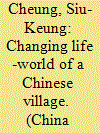|
|
|
Sort Order |
|
|
|
Items / Page
|
|
|
|
|
|
|
| Srl | Item |
| 1 |
ID:
106543


|
|
|
|
|
| Publication |
2011.
|
| Summary/Abstract |
Research into traditional Chinese society engages Chinese villages as a legitimate field for investigation. By looking into the life-world of Da Shu, a village in the New Territories of Hong Kong SAR, this article challenges a research approach that views the Chinese village as a temporal other to the contemporary world. This article demonstrates how the life-world of a Chinese village interplays with the changing historical context. The study examines the economic life that revolves around land and the overall community practices at different times. The study suggests that the life-world of this Chinese village is a historical congeries that involves varying interplays of people with varying dominant rules of time. The subjectivity of people on the ground is always imbued with remarkable historical voices and practices.
|
|
|
|
|
|
|
|
|
|
|
|
|
|
|
|
| 2 |
ID:
105060


|
|
|
|
|
| Publication |
2011.
|
| Summary/Abstract |
The channeling of popular struggles through legal cases is central to the strategy of the emerging "rights defense" movement in China, linking grassroots contention with professional mediators who translate grievances into the institutional environment of law. This was the case in an unusual, ultimately unsuccessful campaign in 2005 to remove an elected village chief in Taishi Village in Guangdong, China, by legal means. While the grievances that sparked the campaign were about the unequal distribution of the benefits from village development, the strategy of instituting a recall procedure and the framing of the campaign in terms of democracy and rule of law obscured distinctly gendered issues of poverty and inequality in the village, even though women were among the most visible protesters. This article employs a "sociology of translation" to link framing processes and power dynamics, thus proposing a methodological approach to reconnecting framing with other aspects of movements. In the Taishi case, the translation of the dispute into the language of law had contrary effects: it opened the door to a legitimate, if temporary, public space for the airing of villagers' claims. At the same time, translation legitimized the voices of "experts" who then became de facto leaders in this public space; it also increasingly shifted the action to the internet, to which the villagers apparently had no access. This analysis raises questions about whether such strategies may result in either the formation of durable rights-based identities among grassroots participants or a sense of being connected to a broader social movement.
|
|
|
|
|
|
|
|
|
|
|
|
|
|
|
|
| 3 |
ID:
118687


|
|
|
|
|
| Publication |
2013.
|
| Summary/Abstract |
This article is based on a field survey conducted in a village whose lands were expropriated, its homes destroyed, and its inhabitants relocated to two blocks of flats built about a hundred metres from the village, and in which new neighbourhood administrations were set up. Supervision of the evictions by local authorities seems crucial in the process of adapting former villagers to their status as urban dwellers. However, the interactions between cadres and people in their new urban setting cannot be understood without taking into account the resistance that preceded the eviction, a resistance that we will seek to reconstruct.
|
|
|
|
|
|
|
|
|
|
|
|
|
|
|
|
| 4 |
ID:
187273


|
|
|
|
|
| Summary/Abstract |
Through investigation of a mass incident to resist the ecological ruin of an emigrant Chinese village in the early 2000s, this article analyses the logic of governmentality underlying the flow of communication and supervision during resolution of a pollution protest. This case study demonstrates how emphasis was placed not on personalistic social ties but on organisational relationships. In examining the key role that overseas Chinese organisations played in resolving this case, this article reveals the governing principle of "diplomatic priority". And due to the governing principles underlying "territory management", self-preservation leads local officials to shirk from administrative responsibility. Fear of responsibility and joint liability functions as a roadblock in the flow of legitimate information, and can lead to covering up or suppressing lawful environmental concerns, thereby hampering the timely resolution of the issue.
|
|
|
|
|
|
|
|
|
|
|
|
|
|
|
|
|
|
|
|
|